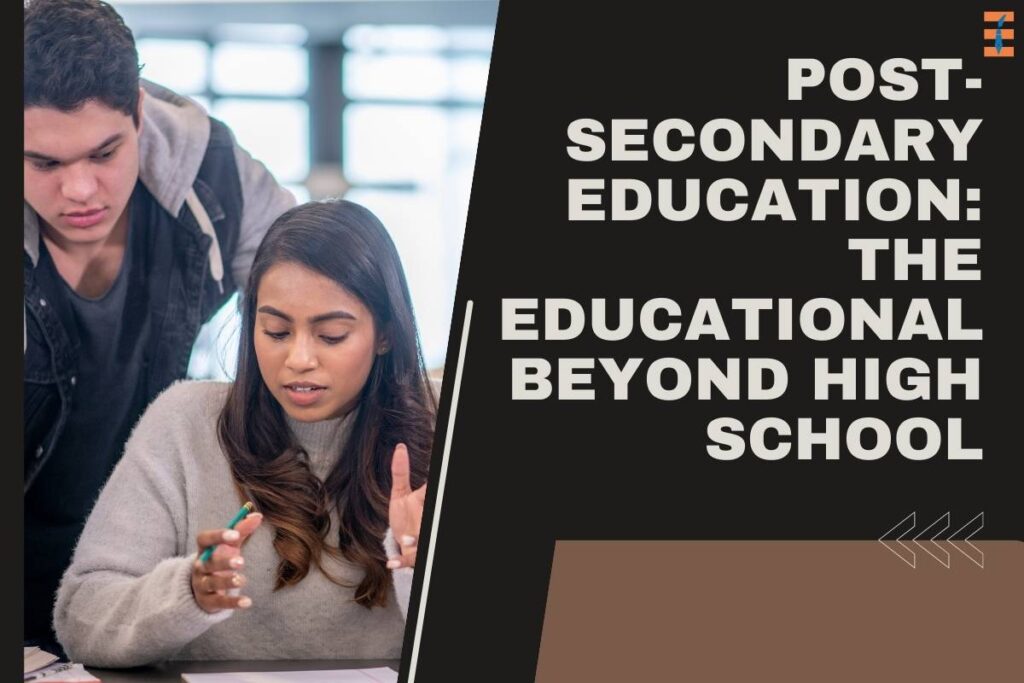Post-secondary education emerges as a transformative phase, beckoning individuals to explore a vast array of opportunities beyond the confines of high school. Understanding the intricacies of post-secondary education, delving into its varied applications, exploring concrete examples, and unraveling the terminologies associated with this educational realm can significantly empower individuals as they embark on this enriching journey.
Defining the Essence of Post-Secondary Education
It is also commonly referred to as tertiary or higher education and is a broad term encapsulating diverse learning experiences that follow the completion of secondary schooling. It signifies a pivotal shift from the generalized nature of high school education to a more specialized and in-depth exploration of academic and professional interests. This phase lays the foundation for advanced knowledge acquisition, skill development, and the pursuit of specialized qualifications that extend beyond the parameters of secondary education.
Examples Illuminating the Diversity of Post-Secondary Education:
1. Universities and Colleges
The traditional pursuit of a bachelor’s degree remains one of the most prevalent paths in post-secondary education. Universities and colleges offer extensive programs spanning an array of disciplines, providing students with the opportunity to specialize in subjects aligned with their passions and career aspirations.
2. Community Colleges

Serving as accessible gateways to higher education, community colleges offer two-year associate degree programs. These programs often act as stepping stones for individuals intending to transition to a four-year university, providing a cost-effective and flexible alternative.
3. Vocational and Technical Schools
For those inclined towards hands-on learning and specific vocational training, vocational and technical schools present tailored programs in trades, technology, healthcare, and other specialized fields. These institutions prioritize practical skill development, preparing students for direct entry into the workforce.
4. Professional Certifications
Acknowledging the evolving landscape of professions, this education also includes avenues for acquiring professional certifications. These certifications validate expertise in specific areas, enhancing an individual’s employability and professional credibility.
5. Online Learning Platforms
The digital revolution has ushered in an era of flexibility and accessibility through online learning platforms. Massive Open Online Courses (MOOCs) and digital certifications provide learners worldwide with the opportunity to engage in post-secondary education without geographical constraints.
Applications:
1. Career Advancement
One of the primary applications of this education lies in the realm of career advancement. Many professions demand specialized knowledge and skills that can be acquired through higher education, positioning individuals for advanced and fulfilling career opportunities.
2. Skill Development
Post-secondary education, whether through traditional degree programs or vocational training, places a strong emphasis on skill development. These acquired skills enhance an individual’s competitiveness in the dynamic job market, contributing to professional success.
3. Research and Innovation
Universities, as key players in post-secondary, contribute significantly to research and innovation. The pursuit of advanced degrees fosters an environment of inquiry, critical thinking, and discovery, resulting in advancements across diverse fields.
4. Personal Growth
Beyond the academic and professional realms, post-secondary education fosters personal growth. It encourages critical thinking, independence, and a broader understanding of the world, shaping individuals into well-rounded contributors to society.
Terminologies: Navigating the Lexicon of Higher Education:
- Undergraduate: Refers to students pursuing their first degree, typically a bachelor’s degree.

- Graduate: Encompasses students pursuing advanced degrees beyond the undergraduate level, such as master’s or doctoral degrees.
- Degree Programs: Structured courses of study leading to academic degrees. Common types include Associate, Bachelor’s, Master’s, and Doctorate.
- Semester/Quarter: Academic terms during which courses are offered, with varying lengths of duration.
- Major/Minor: The primary subject of study (major) and secondary area of focus (minor) within a degree program.
- Alumni: Individuals who have graduated from a particular institution, forming a network of former students.
The Decision-Making Process:
Embarking on the journey of post-secondary education necessitates thoughtful consideration of various factors:
- Career Goals: Identifying career paths aligned with personal interests and aspirations is crucial. Certain professions may require specific degrees or certifications.

- Learning Preferences: Considering the preferred learning environment—be it a traditional campus, online platform, or hands-on vocational training—helps match individual learning styles.
- Financial Planning: Evaluating the cost of education, potential financial aid options, and the return on investment in terms of future career opportunities aids in informed decision-making.
- Researching Institutions: Exploring institutions that offer programs aligned with career goals involves considerations such as faculty reputation, available resources, and industry connections.
- Personal Development: Reflecting on how post-secondary education can contribute not only to professional growth but also to personal development and fulfillment is paramount.
Conclusion
Post-secondary education unveils a dynamic and multifaceted landscape, offering diverse avenues for individuals to explore and excel. Whether pursuing a traditional degree, vocational training, or digital certifications, the journey beyond high school holds transformative potential. Informed decision-making, alignment with personal goals, and a commitment to lifelong learning are pivotal in navigating the intricate terrain of post-secondary education, ensuring a fulfilling and impactful educational journey.










